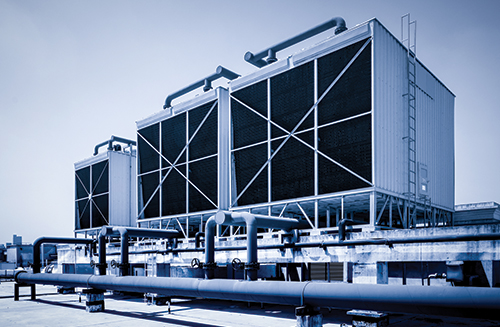

General Purpose Water
General Purpose Water is water that cannot be described as potable but is used in facilities such as residences, industries, hotels and processes for Boilers Feed, Cooling Towers, supply to hospitals and Artificial Kidney Units, to Pharmaceutical Industries and Electricity Power Stations provided they are properly treated.Boiler Feed Water
In boilers water is converted to steam with high thermal capacity. The use of steam is widespread in almost all industries. Steam transfers a large amount of energy in the form of heat and is used in the production process to accelerate chemical reactions, heating, drying of the product, humidification of spaces, sterilization, electricity generation and a number of other applications and processes. For this reason the production of steam in a boiler is one of the most important pars for the operation of the factory. The correct operation of the boiler and the production of good quality steam greatly affect the quality of the products and also the economic operation of the factory as there are many cases (such as paper mill, electricity generation, chemical industry etc) that in case the boiler stops working, the operation of the whole factory is stopped.
Water quality also plays an important role in the life cycle of pipes, boilers and heat exchangers and its optimal processing ensures continuous and high efficiency as well as operational reliability.
The optimal treatment of the supplementary water for the boiler is carried out to reduce corrosion but also the reduction of sediment or sludge deposits inside the boiler’s circuit. The result of good quality feed water in the boiler is the reduction of boiler wear and the hydraulic components of boiler’s circuit, energy loss (blow-down reduction), consumption of chemical additives, reduction of CIP etc.
At the same time, there is the possibility of treating the water of the boiler with chemical additives that improve its operating and performance conditions, dealing with problems such as corrosion and sedimentation.


Boiler Feed Water
In boilers water is converted to steam with high thermal capacity. The use of steam is widespread in almost all industries. Steam transfers a large amount of energy in the form of heat and is used in the production process to accelerate chemical reactions, heating, drying of the product, humidification of spaces, sterilization, electricity generation and a number of other applications and processes. For this reason the production of steam in a boiler is one of the most important pars for the operation of the factory. The correct operation of the boiler and the production of good quality steam greatly affect the quality of the products and also the economic operation of the factory as there are many cases (such as paper mill, electricity generation, chemical industry etc) that in case the boiler stops working, the operation of the whole factory is stopped.
Water quality also plays an important role in the life cycle of pipes, boilers and heat exchangers and its optimal processing ensures continuous and high efficiency as well as operational reliability.
The optimal treatment of the supplementary water for the boiler is carried out to reduce corrosion but also the reduction of sediment or sludge deposits inside the boiler’s circuit. The result of good quality feed water in the boiler is the reduction of boiler wear and the hydraulic components of boiler’s circuit, energy loss (blow-down reduction), consumption of chemical additives, reduction of CIP etc.
At the same time, there is the possibility of treating the water of the boiler with chemical additives that improve its operating and performance conditions, dealing with problems such as corrosion and sedimentation.

Cooling Towers Feed Water
Cooling circuits are found in Engine Cooling, Metal Cooling, Steam Condensing and Cold Store and are divided into three (3) types: single pass, closed and open recirculation.
The treatment of feed water in refrigeration circuits but also of the cooling water that circulates in a cooling system is necessary to prevent sedimentation or sludge deposits, corrosion or growth of microorganisms (for example Biofilm, Legionella) and is done to avoid problems in the operation of the circuit and production machines as well as to reduce maintenance and operation costs.
Cooling water treatment minimizes operation costs (energy reduction, blow-down reduction, water consumption savings, reduction of consumption in chemical additives and CIP), maximizing efficiency by keeping heat exchange surfaces clean and reduces corrosion wear and tear on equipment.
Artificial Kidney Units
Consistent and reliable water quality is the key to a successful dialysis treatment. TEMAK SA, having many years of experience in water treatment, in specialized applications but also in the high quality of services available in the field of Health, has developed through research and innovation the TMED Series. It consists of modern Water Treatment Units adapted to the specific needs of each application.
Having installed more than 150 Artificial Kidney Units worldwide, TEMAK SA has already won the trust of its customers providing the most suitable solutions for excellent and safe dialysis water.


Artificial Kidney Units
Consistent and reliable water quality is the key to a successful dialysis treatment. TEMAK SA, having many years of experience in water treatment, in specialized applications but also in the high quality of services available in the field of Health, has developed through research and innovation the TMED Series. It consists of modern Water Treatment Units adapted to the specific needs of each application.
Having installed more than 150 Artificial Kidney Units worldwide, TEMAK SA has already won the trust of its customers providing the most suitable solutions for excellent and safe dialysis water.

Water for Pharmaceutical Industries
Pharmaceutical Industries have need quality water for:
a) potable
b) de-ionized
c) ultrapure and
d) distilled (injectable), with special quality standards but also almost zero levels of microbial load and endotoxins.
The pharmaceutical industry aims to produce innovative medicines through strict production processes and continuous controls. The quality and safety of each medicinal product are inextricably linked to the water used as a raw material for its production, which of course is subject to equally demanding standards.
Electricity Power Stations
TEMAK SA offers integrated solutions to Electricity Power Stations at all stages of processing, for the needs of the production process and sterilization. In the pretreatment we use disinfection methods – with automatic chlorination, filtration, dechlorination and removal of organic load or with ultrafiltration (UF), softening or antiscalant protection to protect reverse osmosis membranes. In the main treatment the methods are de-ionization or reverse osmosis – single or double pass. The polishing is done be (electro) deionization and disinfection (by the methods of ultraviolet radiation (UV) or ozonation). To ensure the smooth operation of the system but also to combat the microbial load, we offer systems and equipment for chemical cleaning or thermal disinfection (to avoid the use of chemical disinfectants).
The water used to generate steam at power plants (combined cycle plants etc) requires very strict quality standards for ultrapure water or equivalent to deionized water.
TEMAK SA has carried out numerous water treatment projects of ultrapure and deionized quality in the field of industry as well as in power plants, in Greece and aboard.
At the same time, we have significant experience in the most modern technologies used as treatment stages for the production of deionized water, such as that of ultra-filtration or retreatment water through ULTRA FILTRATION membranes, of continuous electrodeionization (CEDI) (polishing stage) or degassing membranes (CO2 stripping stage before CEDI).


Electricity Power Stations
TEMAK SA offers integrated solutions to Electricity Power Stations at all stages of processing, for the needs of the production process and sterilization. In the pretreatment we use disinfection methods – with automatic chlorination, filtration, dechlorination and removal of organic load or with ultrafiltration (UF), softening or antiscalant protection to protect reverse osmosis membranes. In the main treatment the methods are de-ionization or reverse osmosis – single or double pass. The polishing is done be (electro) deionization and disinfection (by the methods of ultraviolet radiation (UV) or ozonation). To ensure the smooth operation of the system but also to combat the microbial load, we offer systems and equipment for chemical cleaning or thermal disinfection (to avoid the use of chemical disinfectants).
The water used to generate steam at power plants (combined cycle plants etc) requires very strict quality standards for ultrapure water or equivalent to deionized water.
TEMAK SA has carried out numerous water treatment projects of ultrapure and deionized quality in the field of industry as well as in power plants, in Greece and aboard.
At the same time, we have significant experience in the most modern technologies used as treatment stages for the production of deionized water, such as that of ultra-filtration or retreatment water through ULTRA FILTRATION membranes, of continuous electrodeionization (CEDI) (polishing stage) or degassing membranes (CO2 stripping stage before CEDI).







